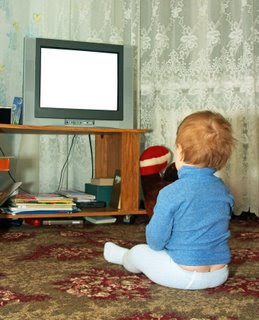 I don’t believe that any parent thinks that their child will become a genious from watching Baby Einstein. The videos are good for introducing different types of animals, colours and music to your infant.
I don’t believe that any parent thinks that their child will become a genious from watching Baby Einstein. The videos are good for introducing different types of animals, colours and music to your infant.
Researchers don’t believe that any good comes from putting yor child in front of the television before 2.
The claim always seemed too good to be true: park your infant in front of a video and, in no time, he or she will be talking and getting smarter than the neighbor’s kid. In the latest study on the effects of popular videos such as the “Baby Einstein” and “Brainy Baby” series, researchers find that these products may be doing more harm than good. And they may actually delay language development in toddlers.
Led by Frederick Zimmerman and Dr. Dimitri Christakis, both at the University of Washington, the research team found that with every hour per day spent watching baby DVDs and videos, infants learned six to eight fewer new vocabulary words than babies who never watched the videos. These products had the strongest detrimental effect on babies 8 to 16 months old, the age at which language skills are starting to form. “The more videos they watched, the fewer words they knew,” says Christakis. “These babies scored about 10% lower on language skills than infants who had not watched these videos.”
It’s not the first blow to baby videos, and likely won’t be the last. Mounting evidence suggests that passive screen sucking not only doesn’t help children learn, but could also set back their development. Last spring, Christakis and his colleagues found that by three months, 40% of babies are regular viewers of DVDs, videos or television; by the time they are two years old, almost 90% are spending two to three hours each day in front of a screen. Three studies have shown that watching television, even if it includes educational programming such as Sesame Street, delays language development.
This growing evidence led the Academy to issue its recommendation in 1999 that no child under two years old watch any television. The authors of the new study might suggest reading instead: children who got daily reading or storytelling time with their parents showed a slight increase in language skills.
Though the popular baby videos and DVDs in the Washington study were designed to stimulate infants’ brains, not necessarily to promote language development, parents generally assume that the products’ promises to make their babies smarter include improvement of speaking skills. But, says Christakis, “the majority of the videos don’t try to promote language; they have rapid scene changes and quick edits, and no appearance of the ‘parent-ese’ type of speaking that parents use when talking to their babies.”
As far as Christakis and his colleagues can determine, the only thing that baby videos are doing is producing a generation of overstimulated kids. “There is an assumption that stimulation is good, so more is better,” he says. “But that’s not true; there is such a thing as overstimulation.” His group has found that the more television children watch, the shorter their attention spans later in life. “Their minds come to expect a high level of stimulation, and view that as normal,” says Christakis, “and by comparison, reality is boring.”
I guess the fact that some of these videos are recommended for infants 6 months and up is really not a good thing…






